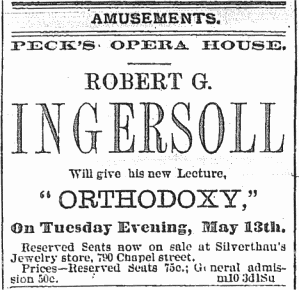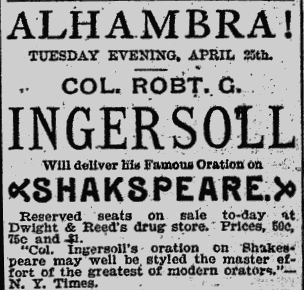========================================================
"An individual has not started living until he can rise above the narrow confines of his individualistic concerns to the broader concerns of all humanity."


"If there is a God who will damn his children forever, I would rather go to hell than to go to heaven and keep the society of such an infamous tyrant. I make my choice now. I despise that doctrine. It has covered the cheeks of this world with tears. It has polluted the hearts of children, and poisoned the imaginations of men. It has been a constant pain, a perpetual terror to every good man and woman and child. It has filled the good with horror and with fear; but it has had no effect upon the infamous and base. It has wrung the hearts of the tender; it has furrowed the checks of the good. This doctrine never should be preached again. What right have you, sir, Mr. clergyman, you, minister of the gospel, to stand at the portals of the tomb, at the vestibule of eternity, and fill the future with horror and with fear? I do not believe this doctrine; neither do you. If you did, you could not sleep one moment. Any man who believes it, and has within his breast a decent, throbbing heart, will go insane. A man who believes that doctrine and does not go insane has the heart of a snake, and the conscience of a hyena."


Love is the only bow on Life's dark cloud. It is the morning
and the evening star. It shines upon the babe, and sheds its
radiance on the quiet tomb. It is the mother of art, inspirer of
poet, patriot and philosopher. It is the air and light of every
heart -- builder of every home, kindler of every fire on every
hearth. It was the first to dream of immortality. It fills the
world with melody -- for music is the voice of love. Love is the
magician, the enchanter, that changes worthless things to Joy, and
makes royal kings and queens of common clay. It is the perfume of
that wondrous flower, the heart, and without that sacred passion,
that divine swoon, we are less than beasts; but with it, earth is
heaven, and we are gods.

To love justice, to long for the right, to love mercy, to pity the suffering, to assist the weak, to forget wrongs and remember benefits -- to love the truth, to be sincere, to utter honest words, to love liberty, to wage relentless war against slavery in all its forms, to love wife and child and friend, to make a happy home, to love the beautiful; in art, in nature, to cultivate the mind, to be familiar with the mighty thoughts that genius has expressed, the noble deeds of all the world, to cultivate courage and cheerfulness, to make others happy, to fill life with the splendor of generous acts, the warmth of loving words, to discard error, to destroy prejudice, to receive new truths with gladness, to cultivate hope, to see the calm beyond the storm, the dawn beyond the night, to do the best that can be done and then to be resigned -- this is the religion of reason, the creed of science. This satisfies the brain and heart.

|
I can talk about things now that would have embarrassed me once. And maybe my story could be helpful to you if you're somehow different from other people, or handicapped. Most of us are, in one way or another. I guess Star Trek had its first beginnings in the fact that as a child, I was different. Handicapped. I had difficulty breathing, eyes that didn't work well in bright sunlight... spindly-legged, weak, uncoordinated. I wasn't a very pretty thing, and I suffered the awful embarrassments that only a child can feel. I don't suppose every writer has to start like that, but -- if I had been the things that I dreamed of being, agile, athletic, admired and popular, I know now that I never would have ended up with as happy a life . I became a reader. Thank God, I became a reader. I lived in a dream world because...it was a helluva lot better world. I was Dr. Doolittle, I was Zane Grey's* Lonely Cowboy...an explorer. Most of it trash, I was an Indian fighter, a fearless soldier...a fighter ace. If you read Peanuts, I was Snoopy. I fought the Red Baron many times.
Certainly, part of Star Trek was written by that boy...dreaming maybe as you do of a better world, in which people would look past our exteriors and see whatever loveliness we had inside us. I remember being about 8 years old in the backyard, sitting in the soap carton, pretending it was a great vessel of some kind -- and the bold, strong person hidden inside of me, he was the captain. I remember that it was an enclosed vessel, because I had a second soap carton pulled down over my head. After sitting there for several hours, still encased in soap cartons, I heard the concerned voices of my parents speculating whether my illness had led to brain damage. Ah, how lovely all our daughters are inside. How fearless, all our sons -- if only we could see it. I remember helping my father clean the garage. Actually, he was cleaning. I was facing the firing squad. The bullets caught me, spun me to the ground, and as I lay there bravely dying, I looked up to see my father watching me with pity on his face, assuming I was suffering some new kind of seizure.
Years later, something brought me back to reality: science fiction. Yes, incredible. Science fiction taught me to live in the real world. Thank you, Homer, my ex-convict friend. Thank you for John Carter of Mars. It made your cage more bearable, and it helped rescue me from mine. And thank you, Claude, for that first copy of Astounding Stories magazine. Sorry you didn't reach sixteen, and grow out of your illness as I did. I was lucky -- a miracle of adolescence. My body mended, I actually became stronger than average -- but science fiction saved me from that, too, saved me from the perils of a strong body.
I'd learned by then that reality is incredibly larger, infinitely more exciting than the flesh and blood vehicle that we travel in here. If you read science fiction, the more you read it, the more you realize that you and the universe are part of the same thing. Science still knows practically nothing† about the real nature of matter, energy, dimension, or time -- and even less about those remarkable things called life and thought. But whatever the meaning and purpose of this universe, you are a legitimate part of it. And since you are part of the all-that-is, part of its purpose, there is more to you than just this brief speck of existence. You are just a visitor here in this time and this place -- a traveler through it. What a difference that makes! As a traveler here, it no longer crushes you that this world is not always fair, or orderly, or understandable. Your passport allows you to fix what you can, to love, to refuse to take part in ugliness -- but meanwhile you are delighted that this is such a varied, colorful, exciting place. As a traveler, you're not here to judge, but to experience. You begin to feel a new affection for the life-forms here. You no longer feel threatened that some may be greater, or lesser, than you. It's only important that you've been given this marvelous opportunity to enjoy this trip -- to learn from it, and in my case, to write about it.
Perhaps you know where I'm leading. On a trip like this -- and it is a trip -- its loveliness is not in the sameness of people and things, but in their incredible variety... Eventually this led me to the Star Trek statement IDIC: Infinite Diversity from Infinite Combinations. Thank whatever created us, we are different. Each of us, and everything around us. To the end of time, if it ever does end, no combination will ever come up quite the same. That's quite a travel package. All of this is how Star Trek began, and it's also something of what it is about. I am an alien -- and so are you. And yet, and this is the loveliest thing of all, we are also part of each other and part of everything that is. I don't know if this has a moral or not, unless it's "don't sit inside soap cartons too long -- unless you enjoy traveling."
So this is Christmas
And what have you done
Another year over
And a new one just begun
And so this is Christmas
I hope you have fun
The near and the dear ones
The old and the young - John Lennon, "So This is Christmas"
Happiness and freedom begin with a clear understanding of one principle: some things are within our control, and some things are not. Keep your attention focuses entirely on what is truly your own concern, and be clear that what belongs to others is their business and none of yours.
When something happens, the only thing in your power is your attitude toward it: you can either accept it or resent it. What really frightens and dismays us is not external events themselves, but the way in which we think about them. It is not things that disturb us, but our interpretation of their significance. [...] We cannot choose our external circumstances, but we can always choose how we respond to them.
People don't have the power to hurt you. Even if someone shouts abuse at your or strikes you, if you are insulted, it is always your choice to vie w what is happening as insulting or not. If someone irritates you, it is only your own response that is irritating you.